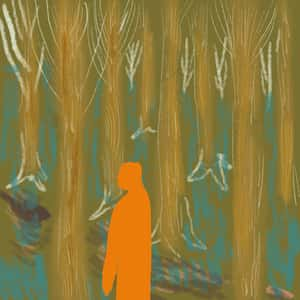The Road Not Taken Summary
“The Road Not Taken” is a poem by Robert Frost that uses the extended metaphor of a traveler in the woods to explore the impacts (or lack thereof) of decisions.
- While walking in the woods, the speaker arrives at a fork in the road.
- The speaker evaluates the two paths: while one initially appears less popular, they are “really about the same.” He chooses the second.
- One day, the speaker imagines with a twinge of irony, he will declare that he chose the road “less traveled by, / And that has made all the difference”—despite his understanding that the two roads are identical.
Summary
Last Updated September 5, 2023.
Introduction
Robert Frost wrote “The Road Not Taken” in spring 1915 and sent a copy of the draft, under the name “Two Roads,” to the British poet Edward Thomas. According to critic David Orr, Thomas seems to have been the first person to misunderstand Frost’s canonical poem—a habit that has persisted in popular misreadings, many of which falsely indicate not only that the speaker has indeed chosen a path “less traveled by” but also that the path he selected has made any difference in his life.
Ironically enough, biographer Lawrance Thompson indicates that Frost may have modeled the poem’s speaker on Edward Thomas. In a 1953 address to the Bread Loaf Writers’ Conference, Frost said that the speaker is based on “a person who, whichever road he went, would be sorry he didn’t go the other. He was hard on himself that way.”
“The Road Not Taken” was first published as the opening poem of Frost’s third collection, Mountain Interval (1916), alongside other well-known poems like “Out, Out—” and “Birches.”
Summary
As “The Road Not Taken” opens, the speaker has just met a fork in the road that he is traveling. The woods are “yellow” in color, so it is most likely autumn. The fork offers the speaker a choice of roads, and the reader quickly comes to understand that these roads symbolize choice in general: every person reaches countless forks in the road during the course of their lives, and each has to make choices based on what limited information they have at that time. The speaker wishes that he could travel both roads and laments that he cannot “travel both / And be one traveler”—that is, that he cannot take two different journeys as the same person. He peers down one road as far as he can, and it bends and disappears in some brush.
Next, in the second stanza, the speaker takes the other road, noting that it has “perhaps the better claim” due to the fact that it is “grassy” and untrodden by other people. After noting this, the speaker undercuts himself, saying that, actually, “the passing there” (or the amount of travel that has taken place on the roads) has been “about the same” for both. In other words, about the same number of people have seemingly taken each road.
In the third stanza, the speaker continues the ending thought of the second stanza: he notes that both of the roads “equally lay” that morning, and no one appears to have traveled either one today, because the leaves are still yellow rather than black with mud from others’ shoes. This observation ends the first sentence of the poem, which has spanned three stanzas. The speaker goes on to say that he would like to think that he can keep the first road for another time, but he realizes that one road always leads to another, which leads to another, and so on—and so he doubts that he will ever be back at this exact fork in the road again.
The speaker predicts in the final stanza that he “shall be telling” the story of this decision at some point in the distant future, “ages and ages hence.” He will say that, when he came to a fork in the road, he took the one that fewer people had traveled, and that this choice has made “all the difference” in the direction his life took. However, the speaker has already spoken about how equal these roads likely are: they look somewhat different from one another, yes, but they have been traveled about the same number of times. It appears, then, that the speaker is aware of the human tendency to somewhat distort experiences, as part of an attempt to make our choices seem considered and intentional when they are really rather arbitrary. The reader might conclude that, even if a person wants their choices to be significant and special, they may in actuality make little difference.
See eNotes Ad-Free
Start your 48-hour free trial to get access to more than 30,000 additional guides and more than 350,000 Homework Help questions answered by our experts.
Already a member? Log in here.
